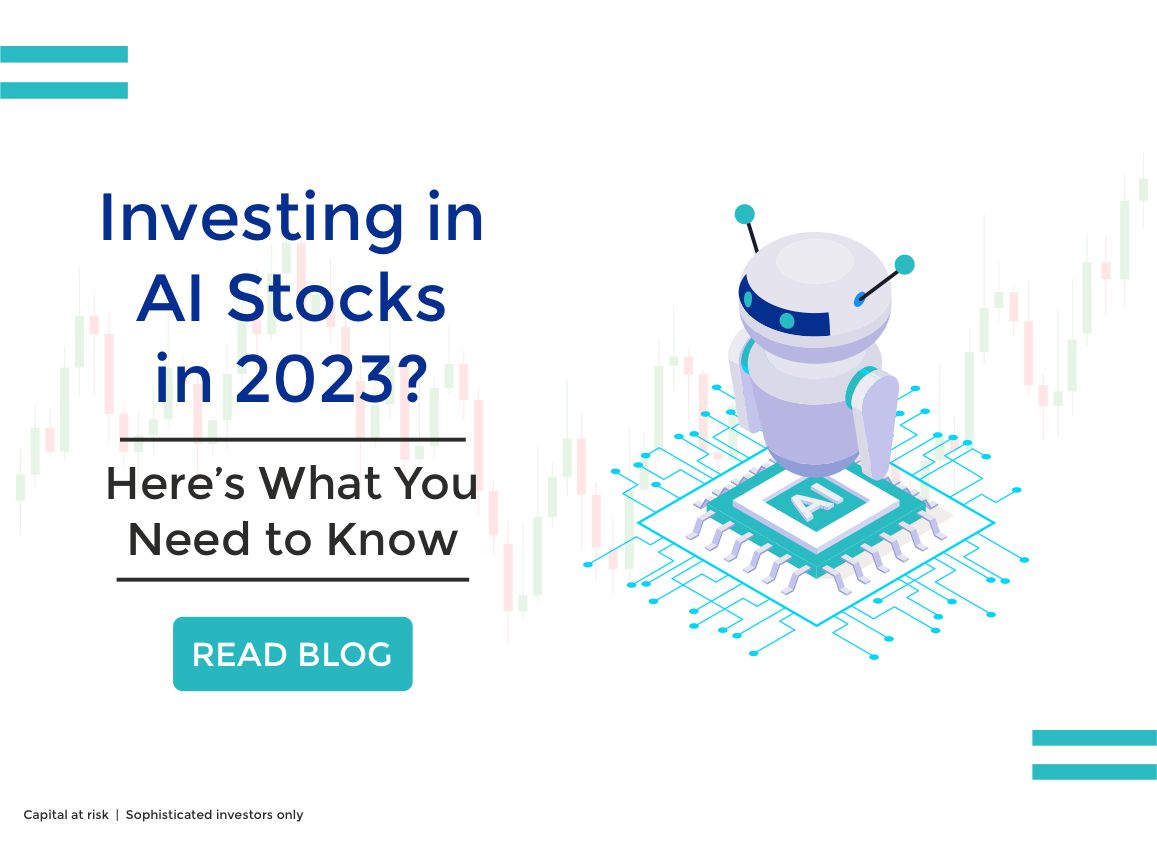Investing in AI Companies in 2023
Posted:
Artificial intelligence (AI), or the use of machines to replicate and replace human intelligence processes in a wide range of situations and industries, is gaining a lot of attention due to its growing importance in our daily lives and economy. From self-driving cars to surgery-performing AI robots AI has gradually become a part of our lives. Investors are attempting to determine the best ways to capitalise on this critical growth industry as AI's capabilities continue to expand.
There are numerous ways to invest in this new trend, similar to previous emerging technologies such as railroads in the late 1800s or the personal computer in the 1980s. While some businesses will thrive, others will fail.
What is Artificial Intelligence (AI)?
AI, or artificial intelligence, refers to the development of computer systems that perform tasks that typically require human intelligence. It entails the development of algorithms and models that enable machines to perceive, reason, learn, and make decisions. AI encompasses diverse techniques and technologies that aim to replicate or simulate human cognitive abilities.
Different types of AI include General AI, Deep Learning, Machine Learning, Narrow AI, and Natural Language Processing (NLP).
AI has numerous applications across industries, including healthcare, finance, manufacturing, transportation, and entertainment. It is used for tasks such as diagnosing diseases, analyzing financial data, optimizing supply chains, developing self-driving cars, and creating personalized recommendations.
Key Players in the AI Industry
There are numerous ways to invest in AI to position your portfolio to benefit from the AI evolution. Investors can invest in companies building AI hardware, selling AI developments, or developing AI solutions. You can invest in companies that use AI technology to improve their products and services as well as improve their marketing or make them efficient.
Let's go through the major AI companies,
NVIDIA (NVDA)
Makes high-performing microchips that power AI software and services. The company designs and manufactures graphics processing units (GPUs) and system-on-a-chip units (SoCs) for the gaming, professional visualization, data center, and automotive markets.
The company's data center includes graphics cards that are used to accelerate a wide variety of data centre applications. The Graphic chips are renowned for demanding workloads that applications like large language models require, and the company just launched a new set of inference platforms specifically designed for generative AI.
NVIDIA is also focusing on self-driving cars. The company develops platforms, including hardware and software, that can power driver-assistance features, as well as fully autonomous driving. A self-driving car must acquire enormous amounts of data in real time from various sensors and cameras, recognize objects like people and other cars, and make sophisticated judgments. They need massive computational power, which Nvidia's technology provides.
NVIDIA includes the licensing and sale of intellectual property (IP) to other companies for incorporating NVIDIA's GPU and deep learning technologies into their own products.
The company offers a professional visualization segment on providing advanced graphics and visualization solutions for focused professionals in industries such as design, architecture, engineering, and entertainment. Its professional visualization segment, which includes its omniverse, may have AI potential.
Alphabet (GOOGL)
Alphabet was created through a restructuring of Google on October 2, 2015, and became the parent company of Google and several former Google subsidiaries. (Source: The Guardian) Alphabet is at the forefront of AI research and development. Its AI division, Google AI, focuses primarily on various areas, including machine learning, natural language processing, computer vision, and robotics. Google's AI technologies power applications such as Google Search, Google Assistant, and Google Translate. The company also acquired DeepMind; a prominent AI research lab known for its work in reinforcement learning.
Moreover, Alphabet recently launched its own AI chat box Bard AI, which works like Chat GPT. (Source: Nytimes). Bard is a large language model, also known as a conversational AI or chatbot trained to be informative and comprehensive.
Microsoft (MSFT)
Microsoft has been actively involved in AI research and development for years. It offers a range of AI-powered products and services, including Azure AI, which provides tools and infrastructure for building AI applications. Microsoft's AI endeavors cover machine learning, conversational AI, computer vision, and healthcare analytics. Notable projects include Microsoft Cognitive Services and the chatbot Xiaoice. Microsoft has also invested in AI research by increasing its collaboration with academic institutions and launching its own AI research lab in Beijing. Microsoft has also acquired several AI startups to increase its AI capabilities.
Since 2019, the company has also been investing actively in Open AI the company that invented Chat GPT. The partnership started with a $1 billion investment with Microsoft exclusively providing cloud computing services to AI Lab. Microsoft recently invested an additional $10 billion in OpenAI following the Chat GPT launch. (Source: CNBC)
Furthermore, Microsoft recently unveiled a new version of the Bing search engine powered by ChatGPT. (Source: Microsoft) But Bing’s chatbot failed the accuracy test until now. OpenAI will be using data from the Bing search engine to help improve ChatGPT chatbox. Moreover, the company is aiming to incorporate ChatGPT features across its product portfolio, including Azure cloud infrastructure services, Office 365productivity software suite, Bing, and Edge web browser.
The company has stated their aim to make AI technology universally accessible through Azure cloud infrastructure services. Microsoft is also leveraging its potential of AI in other ways, such as automating clinical documentation in healthcare to minimize paperwork and administrative costs and allowing users to develop bespoke AI solutions using Azure.
Amazon (AMZN)
Amazon is well-known for Alexa, an AI-powered voice assistant that has acquired broad appeal. The company is significantly investing in artificial intelligence (AI) to improve customer experience, logistics, and data analysis. Amazon's AI initiatives include machine learning, computer vision, and natural language processing. The company's AI services, including Amazon Rekognition and Amazon SageMaker, are utilized by businesses across different sectors.
Further company's Amazon Web Services (AWS) provides AI and machine learning services as well as infrastructure. In its own online platform, the e-commerce behemoth uses AI to provide product suggestions.
Even Amazon's logistics operations benefit from its AI expertise, which aids in scheduling, rerouting, and other methods to increase delivery accuracy and efficiency. Drone deliveries, which the company has long tried to adopt, would be yet another AI use for the tech behemoth.
It is difficult to quantify the influence of AI on Amazon's business, but it is definitely an essential aspect of the company's competitive edge. Throughout its existence, Amazon has been at the vanguard of developing technologies such as e-commerce, e-books, cloud computing, video streaming, and voice-activated technology. AI supplies much of the infrastructure that enables the organization to enter new markets rapidly and successfully.
Micron Technology (MU)
Micron Technology develops high-performance memory and storage hardware for AI applications. Products from the chipmaker are used in data centres and self-driving automobiles.
In 2019, Micron expanded its AI portfolio by acquiring the company FWDNXT. (Source: NASDAQ). FWDNXT hardware and software solutions fuel deep learning solutions and neural networks.
AI ETPs and Index Funds
AI ETPs (Exchange-Traded Products) and index funds are investment vehicles that offer exposure to the AI industry. These funds typically invest in companies involved in developing, deploying, or utilizing artificial intelligence technologies. Investing in AI-focused ETFs or index funds can provide diversification across multiple companies in the AI sector, making it a convenient option for investors looking to gain exposure to the growing AI industry.
Here are a few examples of AI and ETPs and index funds:
Single Stock ETPs
Single-stock leveraged exchange-traded products (ETPs) are a type of investment that seeks to provide magnified exposure to the daily performance of a single stock. Leverage is a technique that allows investors to amplify their returns, but it also amplifies their losses.
Investors can invest in Leveraged ETPs of these stocks, for example, Graniteshares 3x Long NVIDIA Daily ETP, Graniteshares 3x Long Amazon Daily ETP, Graniteshares 3x Long Microsoft Daily ETP, Graniteshares 3x Long Meta Daily ETP, and Graniteshares 3x Long Tesla Daily ETP.
It can be a risky investment, but it can also be a way to generate high returns in a short period of time. However, it is important to remember that leverage can magnify losses as well as gains. Investors should carefully consider their risk tolerance before investing in single-stock leveraged ETPs.
Basket ETPs
FAANG
FAANG ETPs by Graniteshares provide exposure to the equal-weight following companies: Facebook, Amazon, Apple, Netflix and Alphabet.
FATANG
FATANG ETPs by Graniteshares provide exposure to the equal-weight following companies: Facebook, Amazon, Tesla, Apple, Netflix, and Alphabet.
GAFAM
GAFAM ETPs by Graniteshares provide exposure to the equal-weight following companies: Alphabet, Amazon, Facebook, Apple and Microsoft
Conclusion
In conclusion, the AI industry is experiencing rapid growth and technological advancements, with key players such as Google, Amazon, Microsoft, IBM, Facebook, Tesla, and NVIDIA at the forefront. These companies are investing heavily in AI research, development, and implementation across various sectors, including gaming, data centers, professional visualization, automotive, and more.
Investing in AI-focused ETPs and ETFs can provide investors with exposure to the AI industry and the potential for capitalizing on its growth.
However, it's crucial to conduct thorough research and consider the specific investment strategies, fees, and performance history of AI-focused funds before making investment decisions.
As the AI industry continues to evolve and expand, monitoring market trends, staying informed about key developments, and adapting investment strategies accordingly will be essential to make informed investment decisions in the dynamic AI landscape.
ETPs by GraniteShares
| Product name | Ticker(USD) | Ticker(EUR) | Ticker(GBX) |
|---|---|---|---|
|
GraniteShares 3x Long NVIDIA Daily ETP |
|||
|
GraniteShares 3x Long Microsoft Daily ETP |
|||
|
GraniteShares 3x Long Amazon Daily ETP |
|||
|
GraniteShares 3x Long Alphabet Daily ETP |
|||
|
GraniteShares 3x Long FATANG Daily ETP |
|||
|
GraniteShares FATANG ETP |
DISCLAIMER
Please note that GraniteShares' short and leveraged Exchange Traded Products are suitable only for sophisticated investors.
This is a disclaimer stating that all trading and investing comes with risks. Always do your research and do not invest more than you can afford to spend.
GraniteShares accepts no responsibility for any loss or damage resulting directly or indirectly from the use of this blog or the contents.
This blog does not constitute an offer to buy or sell or a solicitation of an offer to buy securities in any company. Nothing contained herein constitutes investment, legal, tax or other advice nor is to be relied upon in making an investment or other decision. No recommendation is made positive or otherwise, regarding individual securities or investments mentioned herein. Any summary list of risk factors does not purport to be a complete enumeration or explanation of the risks involved in a particular investment. Prospective clients must consult with their own legal, tax and financial advisers before deciding to invest. This email contains the opinions of the author and such opinions are subject to change without notice. The source of data is GraniteShares unless otherwise stated. No guarantee is made to the accuracy of the information provided which has been obtained from sources believed to be reliable. This email and the information contained herein is intended only for the use of persons (or entities they represent) to whom it has been provided. Past performance is not a reliable indicator of future results. The value of an investment may go down as well as up and can result in losses, up to and including a total loss of the amount initially invested. Investments may involve numerous risks including, among others, company risks, general market risks, credit risks, foreign exchange risks, interest rate risks, geopolitical risks and liquidity risks. Please note that GraniteShares short and leveraged Exchange Traded Products are for sophisticated investors.


